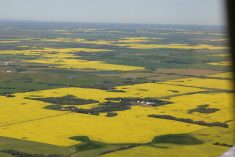Ag industry players argue environmental, social and governance reporting standards are coming and urge producers to be ready for them; others aren’t so sure
Canadian farmers might want to brush up on their report-writing skills.
Environmental, social and governance (ESG) reporting standards are going to affect the agriculture industry sooner than you might think, says Canada’s largest landowner.
“No loans or mortgages will be available from the major lenders unless certain ESG standards and carbon footprint is identified,” said Robert Andjelic of Andjelic Land, who owns 231,428 acres of mostly Saskatchewan farmland.
“These provisions will be implemented and will have to be complied with within a few years down the road. Every major lender and corporation that I spoke with is working on some form of internal ESG and carbon footprint compliance and they will require everyone that they are doing business with to do the same.”
Read Also

Stacking Canada up on gene editing livestock
Canada may want to gauge how Argentina and other countries have approached gene editing in livestock and what that has meant for local innovation.
Andjelic sold his Winnipeg-based commercial real estate company Sun-X in 2007 for a figure estimated upwards of $200 million before investing in western Canadian farmland. He said his experience in his previous line of work taught him the value of being prepared for environmental regulations, adding his company began doing Phase 1 environmental site assessments before anyone else.
“I wanted to protect myself, and now you can’t get a loan or anything else … without an environmental Phase 1, Phase 2 or 3.”
Bonnie Dobchuk, director of sustainability at Croptimistic Technology Inc., agreed that ESG reporting requirements will be a major focus in coming years.
“It’s a fascinating space because so much is going to happen in the near term,” said Dobchuk, who started working with the ag-tech start-up company earlier this year to help prepare for these changes.
Dobchuk says farmers will mostly feel the effects of ESG reporting requirements indirectly.
“If a large public company is being required by regulation to report … on their Scope 3 emissions, that’s their entire value chain,” she said, adding that the Canadian Securities Administrators and the Office of the Superintendent of Financial Institutions are developing increased ESG reporting requirements for Canadian companies.
“The pressure on farmers is going to come from those indirect supply chain transparency forces. It’s all about value chain.”
The agriculture industry is also expected to feel the indirect effects of the recently passed Modern Slavery Act, or Bill S-211, which will mandate increased reporting for certain Canadian companies around labour through the value chain.
These changes aren’t necessarily bad news for farmers, in Dobchuk’s mind, because they will also create opportunities.
The agriculture industry is well-positioned as companies shift away from the volatile carbon credit market toward more of these types of carbon insetting projects.
“If you start to read the sustainability reports of every major market cap company in the world, almost every single one of them says, ‘we’re investing in nature-based solutions.’ The only low-cost carbon removal available to anybody on the planet is in either forestry or agriculture and there are only so many places you can plant trees.”
Dobchuk said she also believes that increased focus on ESG reporting will offer farmers an advantage in terms of market access, with consumer demand for lower-emission crops driving premiums for farmers.
Not everyone agrees.
Stuart Smyth, a professor in the University of Saskatchewan’s department of agriculture and resource economics, said consumers’ top concerns when it comes to food these days are cost and nutrition. He doesn’t see that changing soon.
“Typically, less than 50 percent of consumers and often less than 30 percent support other food factors, which is where ESG would be listed and likely ranked,” said Smyth, who often carries out consumer research in these areas in his role as Agri-Food Innovation and Sustainability Enhancement Chair at the U of S.
“Consumers also expect supply chains and those involved in food production to integrate various social issues without raising the costs. In most instances, this simply isn’t possible.”
He said an example of this is the recent plunge in demand for plant-based meat products.
“Niche-market products are more costly to produce and while consumer surveys might indicate support … if they don’t act with their wallets, then the new products that are launched to meet the rising demand fail.”
One thing that many experts agree on, however, is that farmers should take proactive steps now to be ready for reporting requirements when they come.
Dobchuk said Croptimistic has developed crop emissions footprint reports for their clients in light of this. She said industry reporting that she’s seen to date follows the “regenerative agriculture” model, focused on emissions, on-farm practices and input use.
But Smyth said the lack of consensus around reporting criteria is a problem.
“I think the development of the sustainability index will go a long way in addressing this.”
However, he said any reporting requirements, if they come, will remain voluntary.
“I don’t think that ESG aspects will become formalized into an organized system that has automatic inclusion and forced compliance. Rather, they will be either a voluntary system that is open to enter and leave, or an industry expectation that gets added to all of the existing expectations, such as like animal welfare.”
That’s good news to Trevor Green, a livestock producer in Fleming, Sask., who said data collection is still a challenge for the livestock industry.
“It’s tough in the cow-calf world to find good data collection programs or ways to store and utilize the data,” he said.
Green participates in the Verified Beef program, an industry-led, voluntary initiative aimed at driving consumer confidence in beef production, but he said producers should receive more incentives for programs like this.
He also feels that any program should be voluntary.
“I hate mandatory regulations in agriculture.”















